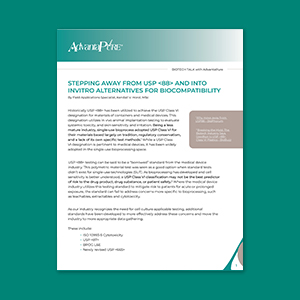BIOTECH TALK

Stepping Away From USP <88> and into In Vitro Alternatives For Biocompatibility
By Field Applications Specialist, Kendall V. Horst, MSc
Historically USP <88> has been utilized to achieve the USP Class VI designation for materials of containers and medical devices. This designation utilizes in vivo animal implantation testing to evaluate systemic toxicity, and skin sensitivity and irritation. Being a less mature industry, single-use bioprocess adopted USP Class VI for their materials based largely on tradition, regulatory conservatism, and a lack of its own specific test methods.1 While a USP Class VI designation is pertinent to medical devices, it has been widely adopted in the single-use bioprocessing space.
USP <88> testing can be said to be a “borrowed” standard from the medical device industry. This polymetric material test was seen as a good option when standard tests didn’t exist for single-use technologies (SUT). As bioprocessing has developed and cell sensitivity is better understood, a USP Class VI classification may not be the best predictor of risk to the drug product, drug substance, or patient safety.2 Where the medical device industry utilizes this testing standard to mitigate risk to patients for acute or prolonged exposure, the standard can fail to address concerns more specific to bioprocessing, such as leachables, extractables and cytotoxicity.
As our industry recognizes the need for cell culture applicable testing, additional standards have been developed to more effectively address these concerns and move the industry to more appropriate data gathering.
These include:
- ISO 10993-5 Cytotoxicity
- USP <87>
- BPOG L&E
- Newly revised USP <665>
ISO 10993-5 and USP <87> provide in vitro testing guidance to address many of the same concerns as USP <88>. The advantages of these two testing batteries are that they are not reliant on animals, and more accurately address the concerns of potential cytotoxicity. It must be noted that due to the flexibility in the “risk-based approach” section of ISO 10993-1, the FDA prefers the ISO standard over the USP standard. Where ISO 10993-5 and USP <87> help to address biological concerns, BPOG L&E and USP <665> address chemical concerns of leachables and extractables. This data provides insights into chemical compounds that may enter the drug product or drug substance and ultimately the patient.
With the availability of more appropriate testing standards, AdvantaPure and many other companies in the industry, have opted to move away from USP <88>. The elimination of the in vivo studies for biocompatibility in favor of more appropriate biological and chemical assessments saves time by forgoing lengthy animal trials. Lack of live animal use also bolsters multiple related areas of responsibility outlined in our sustainability mission, while still providing customers
with confidence in the rigor of our validations. The AdvantaPure division is looking forward to understanding the new version of USP <88>, as it is under revision, and the implications it could have for our industry.
Due to the legacy nature USP Class VI claims, it will take time for our industry to move away from the current version of USP <88>. In the latest iteration of the Quality Test Matrices, BPSA included USP <88>, an inclusion that was greatly debated. In their recent publication, Bioreactivity Testing in Single-Use System Biomanufacturing, BioPhorum has taken the stance that the industry should move away from USP <88>. ASME BPE is additionally in the process of updating their guidance in alignment with BioPhorum’s position. The AdvantaPure division, as a leading industry manufacturer, is proud to be part of this evolution.
The team at the AdvantaPure division looks forward to utilizing alternative test standards more appropriate to the biopharmaceutical processing industry. We are proud to join this initiative in changing the testing landscape for the betterment of our industry.
Download a printable version of this BIOTECH TALK ARTICLE


